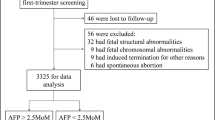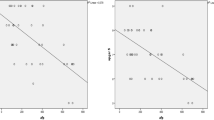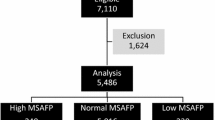Abstract
Purpose
The use of maternal serum alpha fetoprotein (MSAFP) levels as a predictor of pregnancy complications (PC) is well established. We hypothesized that the ratio between the MSAFP/AFAFP levels (RATIO) will more accurately predict PC than MSAFP levels alone.
Methods
Women who had a MSAFP test followed by amniocentesis were divided into two groups: those who had PC comprised the study group and those who had an uneventful pregnancy served as the control group. Data regarding pregnancy and delivery course were collected. The RATIO between the study and the control groups was compared.
Results
166 women were included in the study, of which 24 had PC. A significant correlation was found between the RATIO and intrauterine growth restriction (IUGR) and week of delivery. Six pregnancies had elevated MSAFP levels; two with RATIO below 2 had uneventful pregnancies. Among the other four pregnancies with RATIO above two, one had IUGR and the other, placental abruption.
Conclusion
Our data suggest that the RATIO might serve as a predictor of IUGR and week of delivery. Although the number of patients in the current study was relatively small, the novelty of the proposed simple marker implies that a larger scale study is warranted. Such studies may confirm this finding and a possible advantage of using this RATIO instead of or in addition to MSAFP values for better prediction of pregnancies at risk for PC.
Similar content being viewed by others
References
Thomas RL, Blakemore KJ (1990) Evaluation of elevations in maternal serum alphafetoprotein: a review. Obstet Gynecol Surv 45:269–283
Zarzour SJ, Gabert HA, Diket AL et al (1998) Abnormal maternal serum alpha fetoprotein and pregnancy outcome. J Matern Fetal Med 7:304–307
van Rijn M, van der Schouw YT, Hagenaars AM et al (1999) Adverse obstetric outcome in low- and high- risk pregnancies: predictive value of maternal serum screening. Obstet Gynecol 94:929–934
Krause TG, Christens P, Wohlfahrt J et al (2001) Second-trimester maternal serum alpha-fetoprotein and risk of adverse pregnancy outcome. Obstet Gynecol 97:277–282
An JJ, Ji HY, You JY, Woo SY, Choi SJ, Oh SY, Roh CR, Kim JH (2015) Introduction of a nomogram for predicting adverse pregnancy outcomes based on maternal serum markers in the quad screen test. Arch Gynecol Obstet 292:589–594
Pongsun P, Chanane W, Supatra S, Fuanglada T, Kasemsri S, Suchaya L, Kuntharee T, Theera T (2015) Associations between pregnancy outcomes and unexplained high and low maternal serum alpha-fetoprotein levels. Arch Gynecol Obstet 292:81–85
Bendon RW (1991) The anatomic basis of maternal serum screening. Ann Clin Lab Sci 21:36–39
Berkeley AS, Killackey MA, Cederqvist LL (1983) Elevated maternal serum alpha-fetoprotein levels with breakdown in fetal-maternal- placental barrier. Am J Obstet Gynecol 146:859–861
Heinonen S, Ryynänen M, Kirkinen P et al (1996) Uterine malformation: a cause of elevated maternal serum alpha-fetoprotein concentrations. Prenat Diagn 16:635–639
Perkes EA, Baim RS, Goodman KJ et al (1982) Second trimester placental changes associated with elevated maternal alphafetoprotein. Am J Obstet Gynecol 144:935–938
Salafia CM, Silberman L, Herrera NE et al (1988) Placenta pathology at term associated with elevated midtrimester maternal serum a-fetoprotein concentration. Am J Obstet Gynecol 158:1064–1066
Brownbill P, Edwards D, Jones C et al (1995) Mechanisms of alphafetoprotein transfer in the perfused human placental cotyledon from uncomplicated pregnancy. J Clin Invest 96:2220–2226
Brownbill P, Mahendran D, Owen D et al (2000) Denudations as paracellular routes for alphafetoprotein and creatinine across the human syncytiotrophoblast. Am J Physiol Regul Integr Comp Physiol 278:R677–R683
Spong CY, Ghidini A, Walker CN et al (1997) Elevated maternal serum midtrimester alpha-fetoprotein levels are associated with fetoplacental ischemia. Am J Obstet Gynecol 177:1085–1087
Acknowledgments
The authors thank Faye Schreiber, MS for editorial assistance and Nava Jelin, MS for statistical consultation.
Author information
Authors and Affiliations
Corresponding author
Ethics declarations
Conflict of interest
The authors declare that they have no conflict of interest.
Funding sources
None.
Ethical standards
The manuscript does not contain clinical studies or patient data.
Rights and permissions
About this article
Cite this article
Sharony, R., Dayan, D., Kidron, D. et al. Is the ratio of maternal serum to amniotic fluid AFP superior to serum levels as a predictor of pregnancy complications?. Arch Gynecol Obstet 293, 767–770 (2016). https://doi.org/10.1007/s00404-015-3905-9
Received:
Accepted:
Published:
Issue Date:
DOI: https://doi.org/10.1007/s00404-015-3905-9




